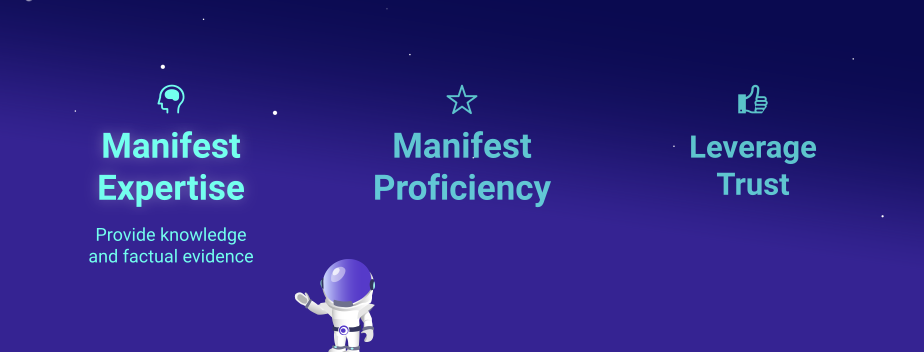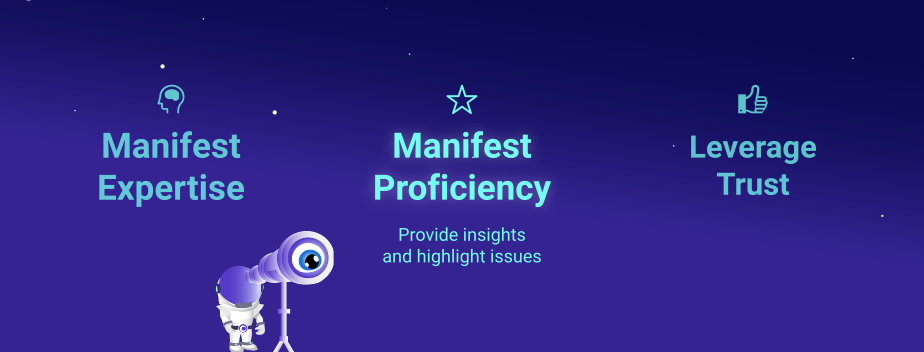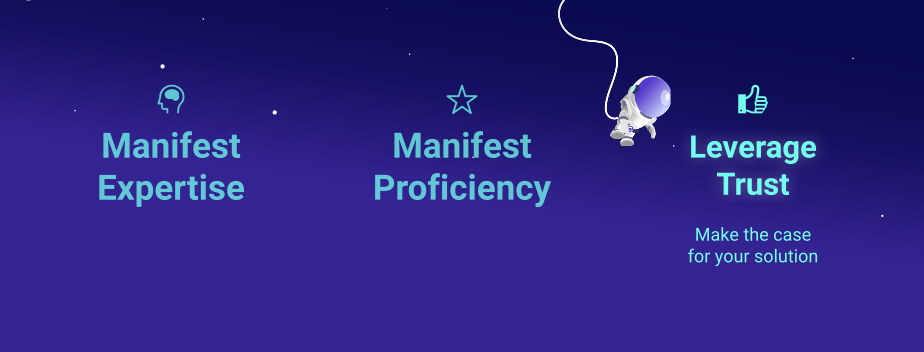Authority is a key aspect of SEO, cemented by Google including it in their E-E-A-T (Experience, Expertise, Authority, Trustworthiness) guidelines, and The Skeptic’s Journey is a conversion-centric strategy designed to build trust as the defining factor in establishing authority, while also driving awareness among target audiences, particularly those that are naturally skeptical.
Prioritizing trust, transparency, and genuine engagement, The Skeptic’s Journey avoids hard-selling tactics and absolute statements, fostering strong connections with readers and boosting conversions.
By fostering trust through the authority content, the company’s offering can be presented without asserting it as the definitive solution, allowing readers to discover the best solution to their challenges without feeling like they’ve been sold to, ultimately leading to increased trust and authority.
This strategy aims to provide clarity on the importance of establishing authority and offer adaptable principles—rather than focusing on implementation steps—that you can adopt at the core of your strategy to greatly increase the likelihood of being seen as an authority.
A Short Summary
Given that this concept as a whole is split into multiple posts, here’s a short summary of the key points, with other blog posts filling in for more nuanced and detailed takes.
Authority can be defined as the ability to make statements met with reduced skepticism through demonstrated expertise, proficiency, and trust. This strategy emphasizes manifesting expertise and proficiency, producing content able to withstand scrutiny, and ensuring long-term credibility and trust.
Authority is crucial for ensuring genuine refusals, leaving a lack of need, want, or funds as the only option for not buying, and removing a lack of trust as a possibility. Providing useful insights backed by expertise empowers the reader in their decision-making, leading to a better reception of your marketing efforts.
Establishing authority pertains to presenting knowledge rather than stating it, and considering the reader’s needs. Avoiding absolute statements and providing only relevant information—with different posts for different knowledge levels—leverages trust that can be used to highlight your offering. The strategy emphasizes guiding the reader to the optimal conclusion rather than trying to convince them, leading to more conversions from more trusting customers.
A Manifested Proficiency Threshold aids in guiding the implementation of this strategy, helping you assess what it takes to garner your audience’s trust, based on factors like the target audience and the immediate impact of your offering while emphasizing the importance of mindfully displaying proficiency.
The Skeptic’s Journey is not a one-size-fits-all strategy, as highlighted by exploring the success of DigitalOcean, a popular developer blog manifesting expertise and proficiency simultaneously.
By the end, your implementation tactic should help you create an authority-cluster with a clear path toward highlighting the benefits of your offering, then leveraging SEO-optimized blog posts to create awareness and lead readers onto the path within said cluster. Ultimately, this should help you balance high traffic with a high conversion rate.
I believe authority is best described as: the ability to make statements met with reduced skepticism, through demonstrated expertise & proficiency, resulting in trust.
Reducing skepticism is key, focusing on making claims able to withstand scrutiny. I don’t believe fully removing a reader’s skepticism is possible, and such a focus would, in my mind, result in poor and questionable implementations. I see the ability of withstanding scrutiny as a true sign of authority.
Explaining the 3 Qualities
The underlying qualities of authority can be described as:
- Expertise
The foundation of authority, showcasing knowledge based on facts and common consensus. A lack of trust in your knowledge is a lack of trust in you.
- Proficiency
Effectively utilizing expertise to form opinions and interpretations.
- Trust
A feeling your audience has towards you—unable to be proven or disproven—determining the likelihood of them engaging with your offering.
Implicit vs Explicit Trust
Dividing trust into two categories can provide a better understanding of what to aim for.
Implicit Trust
Implicit trust is based on credentials or reputation, without experiencing the expertise and proficiency first-hand. This is commonly seen when meeting a new doctor for the first time.
Explicit Trust
Explicit trust is built on personal experiences, resulting in a more stable and enduring trust. This is like having the same doctor for 10+ years, also showcasing how implicit trust can be turned into explicit trust over time.
This strategy focuses on gaining authority through explicit trust, being the more resilient type.
Why Do You Need Authority?
Beyond the aforementioned reasons—namely, gaining trust and reducing skepticism—why exactly is authority so important? What are the tangible benefits of authority?
Ensuring Genuine Refusals
An unsuccessful sale usually boils down to either:
- A genuine refusal due to lack of need, want, or funds
- A lack of trust in the offering
Establishing authority ensures that you only receive genuine refusals. For example, hiring a freelancer is generally from wanting someone more competent, better at execution, or wanting to free up time. Each of those requires trust in the freelancer.
Unfortunately, this strategy cannot help you provide readers with more funds, it is determined to increase the likelihood of gaining trust.
Avoiding the Hard Sell
People generally don’t like being sold to—this is a core consideration of this strategy. Establishing authority by providing useful knowledge and insights meant to empower readers, aids in guiding readers toward deciding on your company’s offering, based on their own judgment.
Having defined the importance of authority, let’s explore how to establish it.
How Do You Establish Authority?
A crucial part of establishing authority is the way you present yourself. Making readers feel the decision is theirs involves presenting knowledge rather than stating it.
Making readers feel the decision is theirs is a crucial aspect of content marketing, and a core principle of this strategy’s approach to establishing authority. This involves presenting knowledge in a way that engages the reader and encourages consideration, as opposed to stating claims with the aim of convincing the reader.
This approach aids in establishing you as a proficient thought leader through key considerations like avoiding absolute statements and considering the needs of the reader.
Avoiding Absolute Statements
Consider “the consequences of X is Y” compared to “some possible consequences of X can be Y”. The difference is subtle but significant, with the first option implying a disagreement with you, and the second option implying a disagreement with your statement.
Proposing the consequences as a possibility rather than a fact, a disagreeing reader is more likely to wonder how you got to that conclusion. Now they’re curious, rather than judgmental (bonus points for catching that reference). I’ve found this small shift in articulation helps create an open mindset for readers.
Considering the Needs of the Reader
Keeping the reader engaged often comes down to providing valuable information, but a focus on addressing their concerns and helping them solve their challenges is crucial. Especially in B2B content, readers will most often be searching for a specific answer, ignoring anything not aligning with that.
It can be tempting to include as much knowledge and insights as possible, in an attempt to either showcase expertise or showcase your offering. I understand the thinking, but consider how it aligns with the need of the reader.
For example, software engineers rarely read a post from start to finish, instead opting to skim through it, looking for the answer they need. This can easily lead to entire sections of—perhaps very valuable and useful information—content being skipped, if it doesn’t align with their goal.
Essentially, every piece of information not relevant to the reader is an open door for them to leave.
Manifesting Expertise

To reiterate, expertise involves sharing factual, well-researched information, or, knowledge based on common consensus, often backed up by studies or scientific resources. Manifesting expertise is to foster trust in your knowledge and research skills.
As a content marketer, this is where you create your basis of existence while acknowledging all knowledge levels.
Catering Beyond Your Target Audience
A statement like “With our offering, you can efficiently solve the problems caused by X” makes two assumptions:
- The reader knows about the problems caused by X
- The reader even understands how X can cause problems
I see companies state “if they don’t understand this, they’re likely not in our target audience”. While I agree with this statement, it’s missing out on the opportunity of educating people, and effectively build a larger target audience.
Addressing all knowledge levels—like explaining how X can cause problems—can result in a sub-optimal reader experience, deterring those already equipped with the necessary knowledge.
Rather, explanations like “how X can cause problems” can be covered in another post, which can then be linked to. This approach will cater your content to a wider audience without deterring more experienced readers. Additionally, it has the added SEO benefits of targeting more keywords and providing internal linking opportunities.
Addressing Reader Questions
To reiterate, your readers are more often than not looking for an answer, and as such, asking and answering questions is a key principle of this strategy. With each question you answer, consider what knowledge the reader may be missing, with the goal of educating them.
For example, the statement “With our offering you can mitigate the issues of X” answers the question “Why do I need your solution”. The full answer may generate questions like:
- What are the issues with X?
- Generally asked by those familiar and experienced with X
- How can X cause issues?
- Generally asked by those just getting familiar with X
Creating a series of posts to address different aspects of a topic and linking them together, allows the reader to gain just the understanding they are missing without skimming through what they already know. Ultimately, this avoids alienating anyone while ensuring all readers understand your content.
Manifesting Proficiency

While expertise is to present factual information, proficiency is to utilize that knowledge to offer valuable insights. Note that manifesting expertise and proficiency are not mutually exclusive, and one will often follow the other. The point is to determine the primary purpose of each piece of content, with the possibility of a second purpose.
Manifesting proficiency is where you begin guiding the reader to your preferred conclusion—that your offering is the best—and foster trust in not just your knowledge, but trust in you. This is where you create your reason for existence, answering the “What are the issues with X?” or “What are the consequences of X?” questions.
Displaying proficiency before/while making the case for your offering encourages larger amounts of trust, i.e., heightens the likelihood of genuine refusals.
Leveraging Trust

Having established trust in both your knowledge and in you, it’s time to leverage that trust and highlight your solution. At this stage, it’s crucial to maintain the same level of expertise and proficiency showcased in other pieces.
This post isn’t to say that conversions are impossible without having established authority. Rather, this strategy is intended to increase the odds of a favorable conversion rate and foster genuine connections with your readers, replicating the feeling of having the same doctor for 10+ years.
What are Your Concerns?
Well, that’s it! It’s been quite the lengthy post, but hopefully, every piece of insight has either provided you with new insights or made some connections you hadn’t considered before. During the development of this strategy I’ve talked it over with a few individuals, and to the best of my ability have adapted it or addressed any concerns that have come up.
That said, there are some concerns I haven’t been able to fit into the main sections of the post, while still being relevant to the point, which I would like to address below. Before that, I’d like to thank you for reading through this, and I’d love to hear any thoughts you have, positive or negative.
What’s the Expected Timeline?
Although I’ve clarified throughout the post how this is not an attempt to define a generalized implementation tactic, but rather a set of core principles, I understand how you may still not be entirely sure how much time is supposed to be spent on this.
The reason I’ve refrained from a generalized implementation tactic is that the timeline is influenced by so many factors, like your post cadence, the complexity of your solution, the level of skepticism of your audience, etc.
That said, I will try to illustrate what a timeline could look like, assuming an example of wanting to create a solid foundation of authority. In this example, the company has established three questions to answer, to manifest expertise. Then, each of those questions prompts two questions to manifest proficiency, each of which then prompts two questions to leverage trust and promote your solution. 3 + 3 * 2 + (3 * 2) * 2 = 21.
I’m not a mathematician so there’s probably a better way of calculating that, but it does show that 21 pieces of content are needed in this example. With one post per week that’s just under five months. However, this assumes you want to establish the entire authority cluster at once, which may not be the case. Authority is only supposed to lead your content.
It’s reasonable that no company wants to go five months without any content focused on authority, and once again this is why I encourage you to evaluate what’s most suited for your situation. One approach to implementation could be:
- First 12 weeks: 100% authority
- Only content like “What are the inefficiencies of X?”
- Next 12 weeks: 50% authority, 50% awareness
- An even mix between “How to mitigate the issues of X” and “How do I implement…?”
- Next 12 weeks: 20% authority, 80% awareness
- Content aimed to maintain and increase authority, though heavily focused on generating traffic
I also want to point out that I don’t see authority as an end-goal. I see it as something to focus heavily on in the beginning and then maintain as time goes on. If you need to lose 20kgs of weight, you don’t lose the 20kgs, only to then stop eating right and working out. You maintain the new healthy lifestyle.
Won’t This Result in Boring Content?
I often get to meet people as they start out in content, and a common thought I hear is, “I want to produce content with unique insight and exciting thoughts”, and I completely understand where the thought comes from. Nobody wants to appear “boring” or “dull”. And, I see how someone might be concerned that this strategy will result in boring content. I’ll concede that “What Is Linux Monitoring?” isn’t exactly an exciting new topic.
The danger of this thinking is that it can often result in a lot of great content, with one of two drawbacks:
- Nobody is seeing it
- Nobody is believing it
So yes, this strategy will most definitely result in “boring” content, but hopefully it’s clear by now why it’s useful and necessary. It’s also important to remember that, unless you’re already an established individual or entity—like Justin Welsh or Uber Engineering—it’s highly unlikely people will be visiting your blog specifically to read your newest post.
Some will! But then it’s a matter of prioritization. Do you want to cultivate a small but loyal audience? Or, a large but trusting audience?
How Do I Measure the Success of The Skeptic’s Journey?
The answer to this will depend on what your current situation is. If you’ve just started out, or are yet to publish your first blog post, then you won’t have anything to measure against. In this case, you might benefit from researching your industry and determining the average conversion rate to expect, then monitoring whether you match or exceed it. You can also set up analytics to track what links people are clicking on your website. Are they actually moving along the path established within the authority cluster?
If you already have an established blog you can follow the same tactics, but you’ll also have the opportunity to compare your conversion rate to a previous period, to see if it’s improved.
At the end of the day, this is still content, and it’s still SEO. Meaning, success is still monitored using all the regular metrics like retention rate and pageviews per user. And, like regular SEO, success may start appearing within a few weeks, or a few months.
Final Thoughts
Given how traffic has had no mention, it’s valid to be concerned about—you can’t convert readers if you have no readers.
In the post “From Authority to Awareness” you will get more insights into using the established content around authority, to then generate SEO content for awareness.